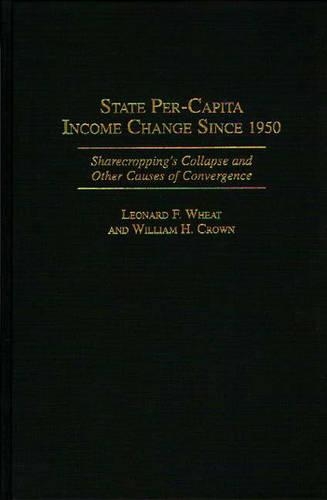
State Per-Capita Income Change Since 1950: Sharecropping's Collapse and Other Causes of Convergence
(Hardback)
Publishing Details
State Per-Capita Income Change Since 1950: Sharecropping's Collapse and Other Causes of Convergence
By (Author) William H. Crown
By (author) Leonard F. Wheat
Bloomsbury Publishing PLC
Praeger Publishers Inc
20th November 1995
United States
Classifications
Tertiary Education
Non Fiction
Macroeconomics
339.20973
Physical Properties
Hardback
200
Description
This book refutes prevailing theories that attribute post-1950 state per capita income convergence to (1) neo-classical adjustment mechanisms, (2) institutional sclerosis, and (3) southern industrialization. Wheat and Crown argue that southern income was low because of slavery's legacysharecropping, agricultural dependence, low urbanization, poor education, high Black population percentages, and low wage rates. The legacy's dominant feature was the sharecropper-tenant farmer system, which replaced slavery. Sharecropping was the foundation of southern poverty. Sharecropping's collapse, beginning around 1950, affected all of the other features of slavery's legacy. For example, millions of sharecroppers out-migrated from the South, shifting poverty to the North and lowering the South's Black percentage. This out-migration, white in-migration, and the civil rights movement jointly raised educational attainment in the South, further boosting southern income. Southern industrialization had only a marginally significant effect. In 1950's high income region, the West, the transport cost element in the price of manufactured goods shrank because of (1) transportation improvements and (2) rapid manufacturing growth, which reduced the need for long distance imports from the Manufacturing Belt. The resulting decline in the West's relative cost of living led to wage adjustments. Consequently, the Westdespite having the highest manufacturing growth rateshad the nation's lowest per-capita income growth rates. Agricultural decline and educational gains stimulated income growth in the Plains. Nationally, per-capita employment gains were a strong influence.
Reviews
.,."informative and challenging work."-Choice
...informative and challenging work.-Choice
[A] literate and well informed book concerning one of the most dramatic stages in the long, arduous economic journey of the U.S. South.-Journal of Regional Sciences
"A literate and well informed book concerning one of the most dramatic stages in the long, arduous economic journey of the U.S. South."-Journal of Regional Sciences
..."informative and challenging work."-Choice
"[A] literate and well informed book concerning one of the most dramatic stages in the long, arduous economic journey of the U.S. South."-Journal of Regional Sciences
Author Bio
LEONARD F. WHEAT is an economist with the Economic Development Administration of the U.S. Department of Commerce. WILLIAM H. CROWN is Associate Professor at Brandeis University. Both have published extensively on topics in regional economics.
